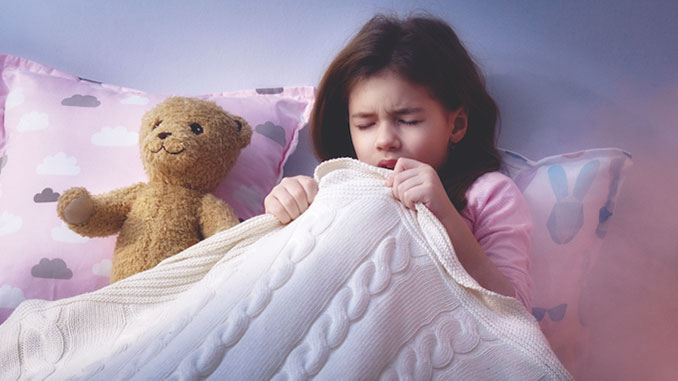
Everything you should know about children’s nightmares
Published: September 28, 2019
By: Sandi Schwartz
It’s the middle of the night and you’re in a deep sleep. You hear a cry of “Mommy!” You wake up and realize your child is frightened and needs you. You stumble into her room in a daze, faced with the challenge of comforting your little one after she’s had a nightmare.
Given this middle-of-the-night drama, it may be surprising to learn that nightmares in childhood are actually normal and play a positive role in kids’ emotional growth and coping skills. About half of all young children experience nightmares, especially 2- to 6-year-olds. Children are particularly prone at this age because this is when they’re developing fears and imagination, and trying to learn the difference between fantasy and reality. Nightmares tend to peak by 10 years of age, after which they usually decrease.
WHY NIGHTMARES HAPPEN
Children’s nightmares stem from many different types of experiences that cause emotional responses, such as hearing a scary story, watching a frightening movie, worrying about school, struggling socially, or reacting to a family change or crisis like a new sibling or divorce. Facing new milestones — potty training, moving out of a crib, learning to ride a bike — can also cause bad dreams. Eating too close to bedtime, some medications and sleep problems can also lead to nightmares. What is also interesting is that experts have found that fear is not the only emotion that can trigger nightmares; confusion, guilt, disgust and sadness are also culprits.
Nightmares typically happen in the second half of the night during rapid eye movement (REM) sleep. Because of this timing, children usually can remember their dreams when they wake up.
As a reaction to stress, nightmares help our children work through their emotions or traumatic events. They consolidate bad feelings into a concrete memory that can be more easily processed, filed away and forgotten. Michael Nadorff, assistant professor of psychology and sleep behavior medicine specialist, equates nightmares to having our own exposure therapy to review and confront experiences so we can overcome our fears about them.
A PEEK INTO KIDS’ DEEPEST CONCERNS
In addition, when our children have bad dreams, we can gain insight into their deepest thoughts and concerns. Rosalind Cartwright, PhD, professor emeritus of psychology, explains that nightmares are like having an internal therapist, helping surface one’s deep-rooted emotions and fears. It’s almost like revealing a secret emotional code that we may not be privy to during the day. By connecting with our children after a nightmare, we can help them work through their issues so that they feel better.
Comforting our children in the moment is important so they can express how nightmares make them feel and realize that they’re OK. When they’re upset, go to their bedroom and give them physical contact like a hug or back rub until they calm down. Ask them to talk about the nightmare, but don’t push too hard if they don’t want to discuss it. Console them verbally by saying: “I understand your dream must have been scary, but it was not real. Mommy sometimes has bad dreams, too. You’re OK. I am here to comfort you. I love you and you are fine.”
TALKING ABOUT IT HELPS
If they want to check under the bed or in the closet for monsters, go along with this exercise. Once they have calmed down, tuck them in with their favorite blanket or stuffed animal and reassure them that you will be nearby if they need you again. If they argue with you about going back to sleep, explain that they need to get their rest so they can enjoy the next day. Provide an example of something fun for them to look forward to.
You can continue to address the nightmare the next day by encouraging them to express themselves. Consider getting creative like drawing or painting pictures, journaling, reading stories and discussing them, or acting them out with puppets. Look for patterns in the themes of their nightmares to try to understand what the cause of stress may be. The most important thing is to encourage your children to talk it out so that they address what’s bothering them while they’re awake.
WHEN NIGHTMARES BECOME A PROBLEM
There are nightmares, and then there are chronic night terrors and nightmare disorder. Here are some signs to look out for to make sure your kids aren’t experiencing something more serious:
- Are the nightmares significantly interfering with sleep?
- Are your kids avoiding bedtime because they are so worried that they will have a nightmare?
- Are the nightmares getting worse and occurring more frequently?
- Are they impacting your child’s school day and interaction with family and friends?
- Are they repeatedly waking up with detailed recollection of long, scary dreams that involve threats to their survival, security and physical well-being?
If you notice these issues persisting, then it’s important to speak to your pediatrician about what is going on. It may be time to explore treatment options like therapy to address stress and anxiety, or a sleep study for a more detailed evaluation.
